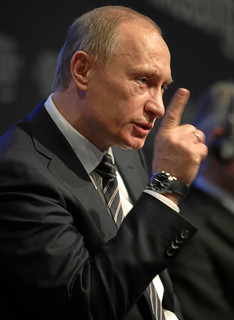When I was 15 years old I went on a school trip to the Soviet Union. As well as Moscow and what was then Leningrad, we were supposed to visit Lithuania–only the Baltic republic declared its independence and seceded just before we arrived, so our itinerary was hastily rearranged, and we were bundled on a plane to Latvia instead.
We arrived in the capital, Riga, to find it in the grip of independence protests of its own. Huge crowds were marching on the streets outside out hotel, demanding freedom from Moscow’s rule. Buoyed by the spirit of the times and the excellent local vodka, we decided to join them. But, knowing no Latvian and little Russian, we managed to attach ourselves to the wrong march, a small counter-protest by Russian-speakers who wanted Latvia to remain in the Soviet Union.
Now, more than 20 years later, Vladimir Putin appears intent on undoing the work of those heady days and reversing the break-up of the Soviet Union. With the world’s attention distracted by the hunt for Flight 370, he has already succeeded in the quiet annexation of Crimea, and the question for the West now is how far he wants to go.
“This is the last territorial demand I have to make in Europe, but it is a demand on which I will not yield.” That was what Adolf Hitler said about the Sudetenland in 1938, days before Britain and France meekly handed it to him in the Munich Agreement. Six months later he annexed the rest of Czechoslovakia. Within another six months he’d invaded Poland, and the Second World War had begun.
True, Putin is no Hitler. But it is a warning from history to those who believe his ambitions will end at Sevastopol. Crimea is a special case, we are told, because of its ethnic Russian population and importance in Russian history. The same arguments were made about the Sudetenland, and its German population, in 1938.
A remark Putin made in 2005, that “the collapse of the Soviet Union was a major geopolitical disaster of the century” has been much quoted in the last few weeks. But what has not been recalled is what he said next: “As for the Russian nation, it became a genuine drama. Tens of millions of our co-citizens and compatriots found themselves outside Russian territory.”
In other words, Putin sees the Soviet Union as a Russian empire, whose break-up has left Russians cut off from their homeland, stranded in the new independent countries.
In this light, Putin’s intervention in Crimea no longer looks like a reaction to a crisis, but something borne out of a long-standing conviction that those lands belong to Russia. Putin saw an opportunity to right a historic wrong, and he took it. Just as he did when he seized parts of Georgia in 2008.
Why, in this case, should he stop at Crimea? There are pockets of Russian population dotted all over the former Soviet empire. What if he wants eastern Ukraine, on whose border Russian forces are already massing? What if he wants Latvia?
Today, Russian-speakers account for more than a quarter of Latvia’s population. Many of them have never been given Latvian citizenship, and cannot vote. They are citizens of nowhere. It would not be much of a stretch for Putin to claim he was intervening on their behalf.
But Latvia is a member of the European Union and Nato, and Western governments could not stand by, and hide behind toothless sanctions, as they have over Ukraine. We would be facing war with Russia.
It will not come to that. Putin is not Hitler, and he will not want to lead Russia into the catastrophe of a Third World War. Instead, we are back in the logic of the Cold War: there is an invisible line running through Europe, like the old Iron Curtain, beyond which neither side can go without risking all-out war. The problem is, this time no one’s quite sure where the line is–and Putin may want to find out.
The timing of his move over Crimea surely has as much to do with Syria as it does with what happened in Kiev. When Barack Obama threatened air strikes against the Assad regime last year, and then didn’t go through with them, Putin sensed weakness.
So far, the Western response to the annexation of Crimea has remained weak. You can almost smell the hope from Western leaders that Putin will go no further. But until he is convinced there is a genuine risk of retaliation, he may go on pushing at that line, trying to find where the new Iron Curtain lies.
If he does, then sooner or later Western governments will have to threaten war–and hope the threat is enough. We may find ourselves embroiled in a very dangerous game of brinkmanship.
While the world was distracted, looking for the airliner that got lost, the Second Cold War may have begun.
This post originally appeared in The Huffington Post UK Blog on 24 March 2014



Leave a Reply